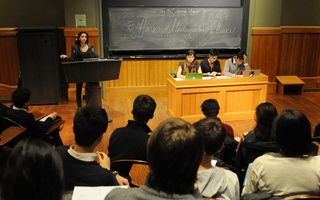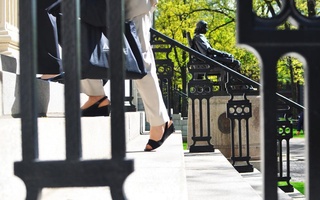
Though the Undergraduate Council led by Tara Raghuveer '14 and Jen Q. Zhu '14 has vocally pressured the administration on certain student issues, the student body still remains at the whims of administrators when it comes to pushing for policy change.
Sirens were blaring, an MIT police officer was dead, and there had been no word from the University for more than an hour. A quarter before two in the morning, Undergraduate Council President Tara Raghuveer ’14 sent a very public email.
The message, addressed to two top College administrators and copied to the approximately 250 members of the UC general list, urged Harvard officials to update the student body on the status of the violence, even if it were no more than “just a word to stay inside and stay calm.”
“Students feel there is no direction,” the email said. “Any updated information would be appreciated.”
This assertive and open pressure on the administration’s emergency response on the night of the manhunt for the Boston Marthon bombing suspects is typical of Raghuveer and UC Vice President Jen Q. Y Zhu ’14’s approach towards student government. It is also typical of how the University responds to that approach.
Although Raghuveer’s email was followed 15 minutes later by another MessageMe update updating the community about the situation in the Greater Boston area, there is no evidence to suggest that Raghuveer’s request influenced Harvard’s decision making. When asked what factors spurred their actions that night, administrators point to accurate information obtained from law enforcement authorities about threats to Harvard. They do not credit the Undergraduate Council.
Former and current UC representatives say that Raghuveer and Zhu are more assertive than their immediate predecessors, but that they are no more effective in convincing administrators to take action. No matter what approach the Council takes to encourage change, these skeptics say, Harvard will continue to act when it wants to and on its own terms.
“We can demand as much relevance as we want, be as assertive as we want, but at the end of the day the administrators make the decisions,” said Sietse K. Goffard ’15, a UC representative from Currier House.
AS THE PENDULUM SWINGS
UC Student Relations Committee Chair James B. Pollack ’14 believes that from one year to the next, UC leaders oscillate between two theories of student governance.
“The UC presidency is kind of like a pendulum in that in a year-to-year basis there are two philosophies with which you can approach being the Undergraduate Council,” Pollack said. “You can approach it as, ‘We don’t have any power so we should work as closely with the administration...because they’re the ones who hold the locks and keys.’ Or there’s the opposite—‘We have the power of organizing students on campus to activate change, to pressure for change, to force the administration to do things that they wouldn’t be comfortable saying yes to.’”
He said that while last year’s UC leaders, former president Danny P. Bicknell ’13 and former vice president Pratyusha Yalamanchi ’13, largely took the former approach, Raghuveer and Zhu have opted for the latter.
Goffard echoed Pollack’s pendulum metaphor.
“We’re swinging back towards...a more forceful [leadership] and not taking no as an answer, essentially,” he said. “I think Tara and Jen embody that kind of leadership.”
For her part, Raghuveer contests the notion that she has “challenged” or been “adversarial” towards the administration. However, she agrees that the Council has been focusing this semester on being responsive and assertive on certain campus-wide issues—particularly after the passage of three student referenda in the November election that put her into office.
“I have spent a lot of time this semester sort of reflecting on what my role should be, and my role should not be to communicate on behalf of the administration to students,” Raghuveer said. “Given the mandate of the election, my role is really to be an advocate for students.”
Read more in College News
A Freshman Drinking ProblemRecommended Articles
-
Raghuveer-Zhu Seek UC RelevanceAs they face off against three other tickets, Raghuveer and Zhu are hoping that their organized campaign, diverse experience, and promise to make the UC more relevant will be enough to win them the election.
-
Raghuveer-Zhu Win UC PresidencyTara Raghuveer ’14 and running mate Jen Q. Y. Zhu ’14 won this year’s Undergraduate Council presidential election with a clear majority of votes, the Election Commission announced Friday night.
-
Student Task Force Report Examines University Gun PolicyA focus group of Undergraduate Council representatives released a report early this month examining the University’s policies on guns, discussing the history of gun-related incidents on campus, and recommending policy actions to prevent campus shootings.
-
 UC Discusses New Website, Study Break Funding
UC Discusses New Website, Study Break Funding -
 At Meeting, Faculty Question Relationship With Administrators
At Meeting, Faculty Question Relationship With Administrators -
OSAPR Director To Depart for MITSarah Rankin, the administrator who expanded programming aimed at educating students about sexual prevention and awareness, will depart Harvard at the end of the month to fill the recently created position of Title IX Investigator for MIT.











